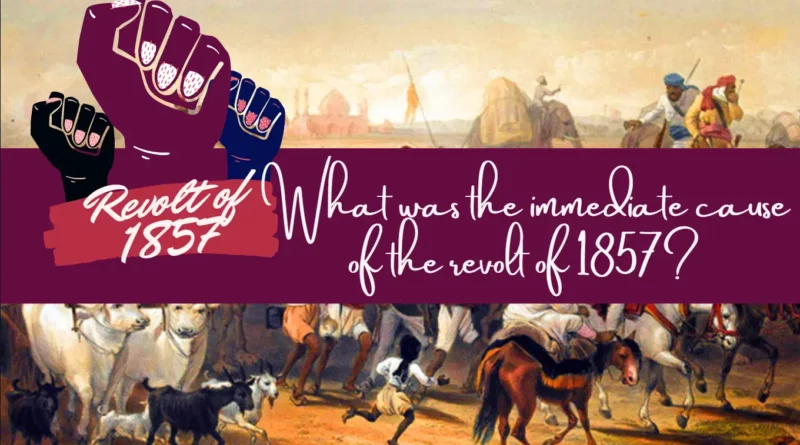What was the Immediate Cause of the Revolt of 1857? UPSC
Complete Coverage of Revolt of 1857 for UPSC Prelims & Mains, after reading this you will get to know the answers to the following question. What was the immediate cause of the revolt of 1857? The revolt of 1857 began from? The revolt of 1857 was started by? Moreover, you will also understand the political, social, and economic causes of the revolt of 1857.
What was the immediate cause of the revolt of 1857?
Social Causes of the Revolt of 1857
Lord Wellesley didn’t allow Christian missionaries like John Marshman, and William Cary to enter Calcutta. But, the Britishers passed an act of 1813 in which Christians from Britain and America got permission to reside in India for missionary work. However, they tried to establish the Christian faith in Indian society.
Further, the people of India don’t want this kind of religious intervention. According to RC Majumdar, by the 1850s, soldiers and people of India start feeling that the government wanted to convert India to Christianity. Moreover, Lord William Bentinck banned the Sati practice by passing the Abolition of Sati act, in 1829. Due to this, people start opposing as they feel this act hurts their emotions. In 1850, the Religious Disabilities Act was passed.

Although, this act protects the rights of a person who converts to their religion. Otherwise, the person would have lost his/her ancestor’s property rights if he changed his religion. In 1856, the Hindu widow remarriage Act was passed with the efforts of Ishwar Chandra Vidyasagar. Again, Indian society didn’t want to accept this act as they feel the interference in the social and religious system.
Economic Causes of the Revolt of 1857
The British completely fragmented the traditional economic fabric of India. The chaotic policies of land realization and heavy taxes broke the back of Indians. By excluding the princely states, they excluded a large artist class from “patronage”.
Moreover, the British discouraged the Indian handloom and cottage industries and forced open the large Indian market to British goods. Due to this, the large urban class got displaced towards agriculture which made the situation worst.
Political Causes of the Revolt of 1857
Dalhousie in 1849 announces that the successor of Bahadur Shah Zafar has to leave the Red Fort. Moreover, Britisher’s policies like the “Doctrine of Lapse“, ” Subsidiary Alliance“, “Effective Control Policy“, etc. made Indian rulers apprehensive.
The Policy of Subsidiary Alliance
The policy of non-intervention was established by Lord Wellesley. In this policy, Indian states were not allowed to maintain their own Armies. But, the state had to bear the cost of the British army that was provided for security. In addition, many states signed this treaty like Hyderabad in 1798, Mysore in 1799, Peshwa in 1803, Bhonsle and Scindia in 1818, and many more.
The Doctrine of Lapse
This is the brainchild of Lord Dalhousie, if the ruler of the state died and don’t have his own male child then the kingdom would come under the British. Dalhousie acquired many states via the doctrine of lapse including Satara, Jaitpur, Sambalpur, Bhagat, Udaipur, Jhansi, Nagpur, and Avadh.
What was the immediate cause of the revolt of 1857?
Many Scholars believe that the revolt was planned by Nana Sahib and Azimullah at Bithur. Moreover, they plan to start the revolution on 31st May 1857. The message of revolution was conveyed with the symbols of “roti” and “lotus”. In between, Lord Canning replaced “Brown Base Rifle” with ” Enfield P-53″ of the British army. This rifle used a cartridge that had to be cut from the teeth before loading. And this cartridge was made from pig fats which are the religious sentiments of Indians.
On 29 March 1857, Mangal Pandey, the soldier of the 34th Bengal infantry of Barrackpore, killed Lieutenant Bagh and Lieutenant General Hudson while denying the use of cartridges. Moreover, Mangal Pandey was court-martialed on 6th April 1857 and was hanged on 8 April 1857. Following this, on “10th May 1857” the native infantry of Meerut rebelled against the company. the revolt of 1857 started in Meerut.
Moreover, on the next day, they reached Delhi and declared Bahadur Shah Zafar the emperor of India and the leader of the revolution. In addition, Bahadur Shah Zafar gives responsibility to Bakht Khan on his behalf. As he was old and not able to handle the revolution. But, Bahadur Shah Zafar surrenders to WSR Hudson in Humayun’s Tomb. At the same time, The revolt was running at other places like Barrackpore, Lucknow Jhansi, etc.
Leaders of the revolt of 1857
- Barrackpore- Mangal Pandey
- Delhi- Bahadur Shah Zafar, General Bakht Khan
- Lucknow- Begum Hazrat Mahal, Birjis Qadir, Ahmadullah
- Kanpur- Nana Saheb, Rao Saheb, Tantia Tope, Ajimullah Khan
- Jhansi- Rani Laxmibai
- Jagdishpur- Kunwar Singh & Amar Singh
- Allahabad & Banaras- Malawi Liaquat Ali
- Farrukhabad- Tafjul Hasan Khan
- Gwalior- Tatya Tope
- Rajasthan- Thakur Kushal Singh & Hardayal
- Mathura- Sevi Singh & Kadam Singh
- Gorakhpur- Gajdhar Singh
What were the Causes of the Failure of the Revolt of 1857?
Sepoy Mutiny was extended to a limited area of India. Moreover, only one-fourth area of India & one-tenth of the total population participated in the revolt. Due to this, the expansion of revolt on large scale didn’t take place. Central leadership was lacking in the planning of the revolt. We can also say that leaders have no experience and understanding of the nature of colonial rule in India.
Moreover, only a few sections of Indian society did not participate in the revolution. Many big landlords acted as a breakwater to storm. Moreover, many people were against the revolution and supported the Britishers. They act as a golden key to making the revolt failed.
Additionally, a large number of educated and emerging middle class considered retrospective steps. Because they believe that Britisher will modernize India. The lack of modern weapons was also the main reason for the revolt’s failure.
Further, all the battles were fought with traditional weapons. Moreover, the British also has some technology at that time like the telegraph, which makes them communicate and transfer information from time to time.
List of Literature written on the Revolt of 1857
- The Indian war of Independence – V.D. Savarkar
- The rough biography of Indian Mutiny- Harald E. Rough
- 1857: The Great Rebellion- Ashok Mehta
- The Indian Mutiny of 1857- G.B. Malesan
- The Sepoy Mutiny and Revolt of 1857- RC Majumdar
- Causes of Indian Revolt- Sir Syed Ahmed Khan
- 1857(Official Literature)- S.N. Sen
- Civil Rebellion in the Indian Mutinies- S.B. Chaudhary
Nature of the Revolt
- John Lorence & Syle- Sepoy Mutiny
- R.C. Majumdar- Neither First nor National nor War of Independence
- LER Rees- A war of Phanatic Religionists against Christians.
- TR Holmes- A conflict between Civilization and Barbarianism.
- J. G. Medley- Racial Struggle for Supremacy
- K.M. Panikar- National Movement
- Lala Lajpat Rai- A Political age well as a National Uprising
- SC Boss- National Uprising
- VD Savarkar- First War of Independence
- Benjamin Disraeli- Is It a Mutiny or a National Revolt
- S.B. Chaudhary- Something close to Independence
- Percival Spear- First Essay Towards Modern Independence
Short Note on the Revolt of 1857 for UPSC
The revolt of 1857 was started by the 20th Bengal NI(Native Infantry) of Meerut and the 3rd LC(Light Cavalry). The revolt of 1857 began in Meerut on 10th May 1857. The immediate cause of the revolt of 1857 was the change of rifles & killing of Mangal Panday. In the mutiny of 1857, Indians introduced communal harmony among each other. Moreover, the Britishers now became aware of the power of Indians. Over time, Indians Weaved their political ideals and came together to achieve them. Hence, they got inspired by the leaders of 1857 in the revolutionary phase of independence.

